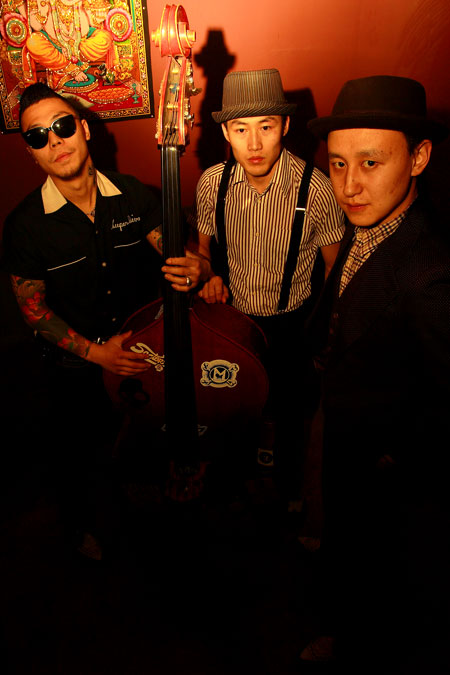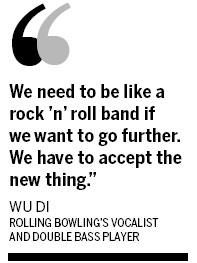
 |
|
From left to right are Wu Di, Xiao Qiang and Xiao Bai, musicians of Rolling Bowling. Provided to China Daily |
An irreverent musical trio punks up rockabilly for young Chinese tastes. Emily Cheng takes a look.
Sitting back and smoking cigarettes in the back lounge of a live house, rockabilly band Rolling Bowling talks about its hopes to introduce one of the earliest styles of rock to Chinese audiences.
Speaking of the potential for the genre to take off in China, Wu Di, the band's vocals and double bass player, says that "Chinese think [rockabilly music] is funny. Many songs are about love and Chinese people like love songs."
As one of just two rockabilly bands in Beijing - and one of only a handful in China - the band has the opportune task of defining what rockabilly means to many locals.
Currently, the majority of the trio's audience comprise of foreigners already familiar with the band's cover songs. However, to attract the Chinese audience, the group also performs a few self-written Chinese tunes.
Chinese locals "don't know what rockabilly is ... We want to make them know what rockabilly is," Wu says.
The self-taught musicians started playing under the name 'Rolling Bowling' in the summer of 2011. Previously Defy, the band changed names after its original vocalist left in the belief that the apocalypse was due in 2012.
It is uncertain whether the members of the jovial trio are messing around or serious about the name-change anecdote, as they meet most questions with joke answers.
Throughout the interview, the three banter like brothers. Xiao Qiang, the band's guitarist, has known Xiao Bai, the drummer, for about seven years now, and it shows in their dynamic.
Neither had envisioned that they would be playing music for a living, especially not rockabilly music.
Characterized by the '50s fashion of slicked hair, polished outfits and tattoos, the dance-inducing genre - popularized by musicians such as Elvis Presley and The Stray Cats - is an old-school style that lacks the grunginess popular among Chinese listeners.
Rockabilly's more modern version, psychobilly, may be the key to the band's future success.

"They will be the first psychobilly band in China," Clement Berger, co-owner of Temple Bar, where Rolling Bowling is the resident band, says.
The passionate Frenchman, who once organized gigs and concerts in Beijing for fun, explains that psychobilly is rockabilly's evolution; it is stronger and louder.
"The double bass is faster and usually they even use a double kick for the drum kit, like metal ... People love psychobilly because it's like rockabilly but you can dance rock 'n' roll as you can have mosh pits."
Wu agrees that the band needs to incorporate the harder-to-play music into their routine.
"Many people, young people, just think that rockabilly is for grandmas or grandpas. They don't like rockabilly like in Europe. But psychobilly mixes some punk music so the young people think that it is rock 'n' roll. We need to be like a rock 'n' roll band if we want to go further. We have to accept the new thing," he says.
The band hopes to tour China to disperse their music to a wider audience. They toured 15 Chinese cities last September, but are uninterested in talking about the experience in detail. It was "just OK", Xiao Qiang says, citing a lack of preparation for the tour's mediocrity.
They have also been recording their first EP (extended play) in a friend's studio, due for release in May, which Xiao Qiang describes to be a "boring" process.
"Recording is just like a job. It's not like a show where you have the passion. You are like a machine," Wu says.
Wu, the member who appears both vocally and aesthetically to be most passionate about the rockabilly lifestyle, explains that, like most Chinese music fans, it was with the introduction of MTV in China in the 1980s that he first came across rock.
Born in Chongqing and living in a factory throughout his childhood, Wu's music goals initially were quite shallow: He was attracted to the rocker look and wanted to emulate the music of popular bands such as Linkin Park.
It was after traveling to Chengdu that Wu's eyes were opened.
"I met some foreign guys and they told me, 'If you like punk, Blink 182 is rubbish.' So I asked: What is real punk rock? Show me. Now I know. Then I became interested in The Rolling Stones, The Who ... then I decided I wanted real rock 'n' roll, I wanted real music."
Also a Rolling Stones fan, Xiao Qiang, originally from Daqing of Heilongjiang province, recalls being introduced to music from a fellow student at his art school. It is his love for the blues, hinted in the rockabilly genre, which has kept him pursuing a career as a musician.
Despite the disapproval of his parents, Xiao Bai abandoned further education to also pursue his musical calling.
"Expression through music is very simple, very fun, and not complex. We can go to the bar, dance, drink," he explains of his lifestyle choice.
At the end of the day, whether the band gets rich and famous or remains quietly popular with a small crowd in Beijing, the trio collectively affirm that they will be content.
There's no turning back now, Xiao Qiang says. "We will play until we die ... maybe."
Contact the writer at sundayed@chinadaily.com.cn.
